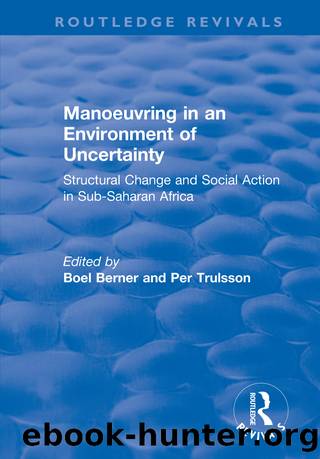Manoeuvring in an Environment of Uncertainty: Structural Change and Social Action in Sub-Saharan Africa by Boel Berner & Per Trulsson

Author:Boel Berner & Per Trulsson [Berner, Boel & Trulsson, Per]
Language: eng
Format: epub
Tags: Political Science, General
ISBN: 9781351728270
Google: 2FI8DwAAQBAJ
Publisher: Routledge
Published: 2017-11-01T11:06:10+00:00
Part III
Individual and Group Strategies
6 Entrepreneurs as Path-Finders in Processes of Social Change
PER TRULSSON
Introduction
In the search for workable development strategies, development theory has changed significantly during the past three decades. Having shifted from the idea that development must be orchestrated from above, the prevailing idea today is that development must evolve from below (Hyden, 1994). The main agents of societal change are no longer representatives of the state, but individuals operating in civil society; here the more important change agents operate in the sphere of private economic activity. Since the early 1980s, market liberalisation to encourage private initiatives â and enterprising activity in particular â has increasingly been looked upon as the main road to development.
Structural adjustment programs in Africa have focused on changing the formal institutional framework so that societal change may occur. Changes in the economic sphere are encouraged by creating an 'enabling environment' for private venture activities. However, as argued, for example, by Steen Seierup (1996, p.97), 'implementation of policies... cannot be successful unless it is based on existing entrepreneurial strategies'. Such an understanding often seems to be lacking in enterprise development programs. An understanding of entrepreneurial activity, I would argue, must go beyond the preconceived ideas based upon homo economicus, the rational economic man. A more adequate understanding should place entrepreneurial activity in a social context in order to see the forces that shape everyday activities of entrepreneurs. It should also seek out the structural consequences of such action.
In this article I will argue for an understanding of processes of structural change that builds upon an actor-oriented perspective of social action and, more particularly in this case, of entrepreneurial action. The core objective of such a perspective is to identify and study 'change agents'. It is argued that by studying how change agents manoeuvre in uncertain environments we may obtain a much better understanding of the future development path of the societies in which they operate.
The article is structured in the following manner. I first state my case, arguing for the usefulness of an actor-oriented approach in studying structural change. I then present an example to illustrate my case, looking at the role of entrepreneurship in societal change (or 'development' as some prefer to label it) in Tanzania. A Schumpeterian understanding of entrepreneurs as potential 'agents of change', i.e., actors who break with established patterns of behaviour and seek alternative paths, is emphasised (see for example Schumpeter, 1947; 1949). Entrepreneurial activity is understood to be socially embedded and based upon relations in both the formal and informal spheres of society; entrepreneurs require specific skills to manoeuvre between the different demands they face in acting within the two spheres. In this process they take advantage of the institutional uncertainty arising from the co-existence of sometimes incompatible formal and informal institutions and their conflicting demands.
Building on findings from my previous work on entrepreneurial activity in Tanzania, I seek to explain how entrepreneurs' social actions may have structural consequences in both the formal and informal spheres.
Download
This site does not store any files on its server. We only index and link to content provided by other sites. Please contact the content providers to delete copyright contents if any and email us, we'll remove relevant links or contents immediately.
Man-made Catastrophes and Risk Information Concealment by Dmitry Chernov & Didier Sornette(5984)
The Revenge of Geography: What the Map Tells Us About Coming Conflicts and the Battle Against Fate by Kaplan Robert D(4063)
Zero Waste Home by Bea Johnson(3823)
COSMOS by Carl Sagan(3611)
Good by S. Walden(3538)
In a Sunburned Country by Bill Bryson(3526)
The Fate of Rome: Climate, Disease, and the End of an Empire (The Princeton History of the Ancient World) by Kyle Harper(3048)
A Wilder Time by William E. Glassley(2849)
Camino Island by John Grisham(2788)
Organic Mushroom Farming and Mycoremediation by Tradd Cotter(2681)
The Ogre by Doug Scott(2671)
Human Dynamics Research in Smart and Connected Communities by Shih-Lung Shaw & Daniel Sui(2490)
Energy Myths and Realities by Vaclav Smil(2478)
The Traveler's Gift by Andy Andrews(2445)
9781803241661-PYTHON FOR ARCGIS PRO by Unknown(2356)
Inside the Middle East by Avi Melamed(2346)
Birds of New Guinea by Pratt Thane K.; Beehler Bruce M.; Anderton John C(2245)
A History of Warfare by John Keegan(2228)
And the Band Played On by Randy Shilts(2180)
